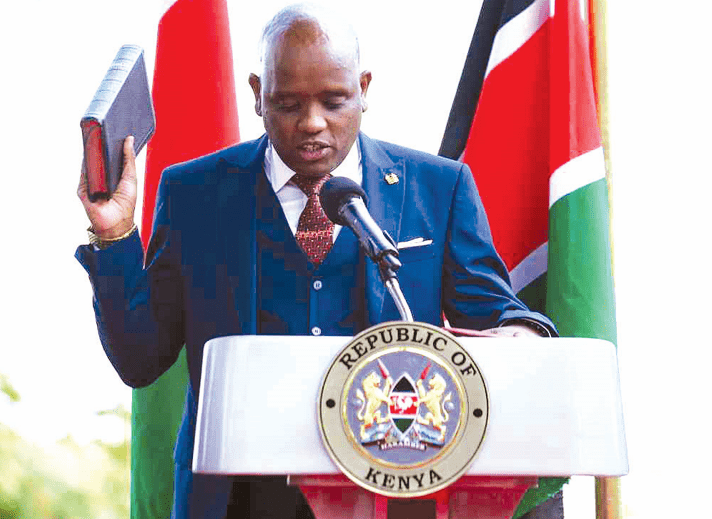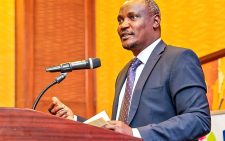CAS posts: Notable names to remain in political cold

Two former governors and a former nominated senator are among the big names likely to remain in the political cold for some time after the President abandoned his earlier resolve to appoint Chief Administrative Secretaries (CASs).
The scrapping of the CAS positions was part of the decision to trim government spending after the withdrawal of the 2024 Finance Bill, said President William Ruto.
He also disclosed that withdrawing the finance bill will force the government to borrow an additional Sh1 trillion for the 2024/2025 financial year.
Former governors Evans Kidero (Nairobi) and Samuel Tunai (Narok) and former nominated senator Millicent Omanga are among the high-profile people who will now not join the government.
Others include former Starehe MP Margaret Wanjiru, former MPs Wilson Sossion, Charles Njagua Kanyi, Wesley Korir, Rehema Jaldesa, Chris Wamalwa and Benjamin Washiali.
Several demands
The scrapping of the CAS position was one of several demands made by Gen Z protesters on the government to cut its expenditure.
President Ruto disclosed on Sunday evening that the scrapping of CAS posts is among the austerity measures his government has taken to tackle the fiscal deficit that continues to expose Kenya to internal and external vulnerabilities.
Though Parliament had passed the required legislative approvals to facilitate their appointments, he said, CASs will only be appointed once economic stability returns.
Speaking in a televised interview with journalists, Ruto cited Kenya’s bad economic situation and the government’s rising wage bill.
“No CAS will be appointed until we have an economy that supports more opportunities,” said Ruto.
His announcement means a bleak political future for the likes of former Kipkelion East MP Joseph Limo and former Tharaka Nithi woman representative Beatrice Nkatha who had been nominated to serve in the ministries of Trade and Investments and the National Treasury, respectively.
Other recognisable names on the list include Ruto’s digital strategist Dennis Itumbi, former Laikipia Woman Representative Cate Waruguru, Ann Wanjiku Mwangi, Nicholas Ngabiya Rioba, Edwin Sudi Wandabusi, Rehema Hassan, Mohamud All Saleh, Alfred Agoi Masadia, Hussein Tuneya Dado, Charity Nancy Nanyama Kibaba and former MPs Onesmus Kimani Ngunjiri and Victor Kioko Munyaka.
Prospects deemed
The nominations were made nearly two years ago, and Ruto’s decision now deems their prospects of joining the government.
The 50 CASs were nominated early last year before being quashed by the High Court, which ruled that the President’s action was unconstitutional.
A three judge-bench argued that even though there was public participation for the initial 23 positions, the process did not extend to the newly created 27 posts.
The nominations had faced the first hurdle when National Assembly Speaker Moses Wetang’ula referred the list back to the President, noting that the House had no constitutional authority to vet the nominees.
“The obligation to respect, uphold and defend the Constitution enjoins the House to refrain from assuming and discharging a role that it has not been expressly assigned by the Constitution or written law,” the Speaker’s memorandum to the President said.
“In that regard, the National Assembly is unable to vet the nominees in the absence of an express constitutional or statutory requirement to do so.”
The court’s decree meant that some of them, including Isaac Mwaura, Nicholas Gumbo, Fred Outa and former Kisii deputy governor Joash Arthur Maangi, were assigned other roles in the government.
First Lady office
MPs later passed the National Government Laws (Amendment) Bill 2023, which removed the initial cap on the number of CASs, at 22, and replaced it with as many as required, giving Ruto an opportunity to appoint the individuals
Ruto also announced the scrapping of the offices of the First Lady and Second Lady, saying that the weak economy and recent protests that saw him withdraw the contentious 2024 Finance Bill made their existence no longer tenable.
The office of Ruto’s wife, Rachel, focuses on empowering women through initiatives like business training and organising them into savings and credit cooperatives (Saccos) to enhance financial inclusion.
The fate of her flagship initiative, “MaMa Doing Good”, hangs in the balance as it was aimed to bring socio-economic transformation through women’s and youth economic empowerment, and environmental and climate action.







